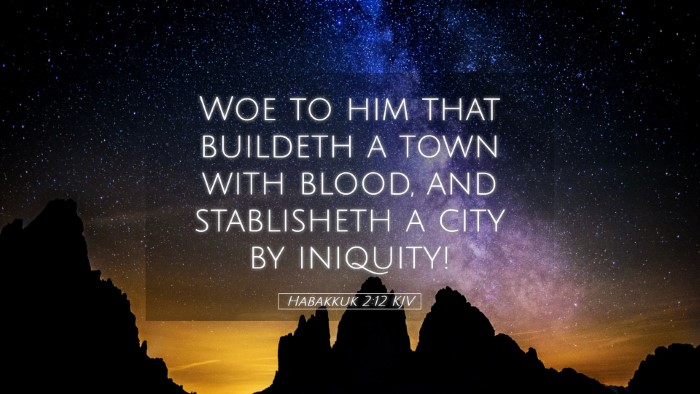Old Testament
Genesis Exodus Leviticus Numbers Deuteronomy Joshua Judges Ruth 1 Samuel 2 Samuel 1 Kings 2 Kings 1 Chronicles 2 Chronicles Ezra Nehemiah Esther Job Psalms Proverbs Ecclesiastes Song of Solomon Isaiah Jeremiah Lamentations Ezekiel Daniel Hosea Joel Amos Obadiah Jonah Micah Nahum Habakkuk Zephaniah Haggai Zechariah MalachiHabakkuk 2:12
Habakkuk 2:12 KJV
Woe to him that buildeth a town with blood, and stablisheth a city by iniquity!
Habakkuk 2:12 Bible Commentary
Commentary on Habakkuk 2:12
Text of Habakkuk 2:12 (KJV): "Woe to him that buildeth a town with blood, and stablisheth a city by iniquity!"
Introduction
Habakkuk 2:12 serves as a prophetic indictment, addressing the moral and ethical failures of those who establish cities through violence and wickedness. In this verse, the prophet warns of the dire consequences awaiting those who engage in such actions. This commentary draws insights from esteemed public domain commentators to illuminate the gravity of this warning.
Contextual Background
The context of Habakkuk is set against the backdrop of the impending judgment of Judah and the Babylonian invasion. The prophet questions God’s righteousness in allowing such injustices to prevail. This specific verse reflects the divine response that highlights the futility of building on a foundation of sin.
Insights from Matthew Henry
Matthew Henry emphasizes the moral culpability involved in constructing cities through violence. He notes that the use of bloodshed as a means to build societal structures leads to a foundation of iniquity that cannot last. According to Henry, cities established by injustice bring about divine judgment:
- Moral Foundation: Henry argues that a city founded on bloodshed is bound to collapse under its own weight. True prosperity can only be rooted in righteousness.
- Divine Retribution: He reflects on the assured retribution from God, highlighting that divine patience has limits, and those who perpetuate violence will ultimately face consequences.
Insights from Adam Clarke
Adam Clarke provides a detailed examination of the verse and highlights the social implications of such actions:
- Social Justice: Clarke posits that the establishment of a city through iniquity not only taints its creators but also corrupts its residents. A society built on such foundations cannot flourish in peace.
- Woe to the Oppressor: Clarke reiterates the prophetic call of 'woe' as a dire warning against oppressors, emphasizing that God’s judgment will befall those who take advantage of the innocent.
Insights from Albert Barnes
Albert Barnes brings forth a theological perspective concerning the nature of cities built through violence:
- Divine Sovereignty: Barnes indicates that God’s sovereignty oversees all nations and cities. He sees this verse as a reminder that human attempts to pursue power through corrupt means cannot escape divine oversight.
- Historical Examples: Citing historical cities that fell due to moral decay, Barnes encapsulates the inevitable decline of those societies that ignore just principles, reinforcing the timeless relevance of this verse.
Spiritual Implications
For pastors and theologians, the implications of Habakkuk 2:12 are profound. This verse serves as a beacon for evaluating the integrity of one's own foundations—both personally and communally. The following points may be relevant:
- Examination of Foundations: Believers are encouraged to assess whether their pursuits, institutions, or ministries are aligned with righteousness or if they inadvertently participate in systemic injustices.
- Call to Advocacy: The Church is positioned to advocate for justice and righteousness, ensuring its endeavors are not merely successful in human terms but are also pleasing to God.
- Hope Amidst Judgment: While the verse speaks of woe, it serves as a reminder to turn from corrupt practices and seek redemption, reflecting God’s greater purpose for justice and righteousness in society.
Conclusion
Habakkuk 2:12 manifests a critical theological principle relevant throughout history. It warns against the perils of establishing power through unrighteous means and calls for a commitment to justice, integrity, and moral foundations. The insights offered by Matthew Henry, Adam Clarke, and Albert Barnes collectively remind us of the lasting implications of building communities that honor God’s design for humanity. For scholars and practitioners alike, this text encourages an active pursuit of justice grounded in biblical truth.


